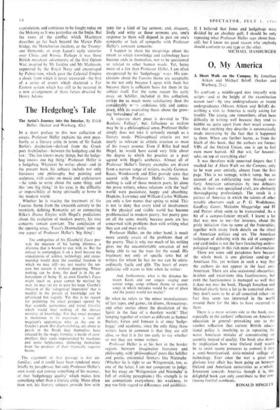0, My America
A Short Walk on the Campus. By Jonathan Aitken and Michael Beloff. (Seeker and Warburg, 2I s.)
To confront a middle-aged don (myself) with scripts—and at the height of the examination season too! —by two undergraduates or recent undergraduates (Messrs Aitken and Beloff) de- scribing a visit to America is really asking for trouble. The young, one remembers, often have difficulty in writing well because they tend to bubble so, quite apart from their usual assump- tion that anything they describe is automatically made interesting by the fact that it happened to them. When one further learns, as from the blurb of this book, that the authors are former VIPs of the Oxford Union, one is apt to feel even more hunted. All that wit, for heaven's sake, on top of everything else!
It was therefore with unnerved fingers that I reached for A Short Walk on the Campus, only to be won over entirely, almost from the first page. This is no teenage, with-it romp, but an account of an exhilarating tour through over forty American universities by two debaters who, in their own specialised craft, are obviously thoroughgoing professionals. The result is a picture of America in which the talents of other notable observers such as P. G. Wodehouse, Geoffrey Gorer, Malcolm Muggeridge and Ill and Petrov often seem to be transcended. As a bit of a campus-fancier myself, I learnt a 'lot that was new to me—for instance, about the grisly initiation rites to some of the fraternities, together with many fresh details on the. ritual of American politics and sex. The Americart technique of debating with the aid of computer and card-index is not the least fascinating anthro- pological nugget in this rich mine of information.
There are some odd paradoxes here because the whole book is one glorious send-Up of American life, yet written in such a way that the authors do not appear in the least anti- American. There are also occasional obscurities, in-jokes and excursions into facetiousness, but even the facetiousness is managed so well that it does not mar the book. Though Jonathan and Michael clearly have a lot to be conceited about, they don't seem to be at all conceited either—in fact they seem too interested in the world around them for the idea to have occurred to them.
There is a more serious side to the book, too, especially in the authors' reflections on American education in general—provoking one to the sombre reflection that current British educa- tional policy is involving us in repeating the worst American mistake of concentrating On quantity instead of quality. The book also shows by implication how wise Oxford itself would be to resist recent pressures to convert it into a semi-Americanised, civic-minded college of 'technology. Ever since the war a great and glorious love affair has been going on between Oxford and American universities as a•whole. Irreverent towards America though it is, this delightful book can only contribute to that con- tinuing fruitful symbiosis.
RONALD HINGLEY






























 Previous page
Previous page